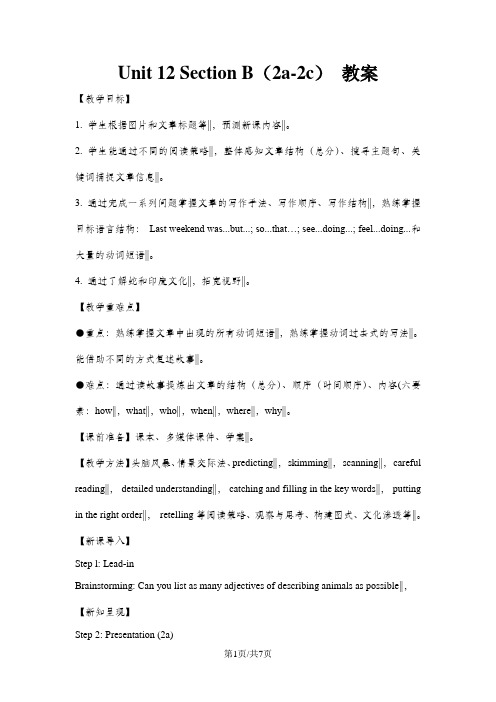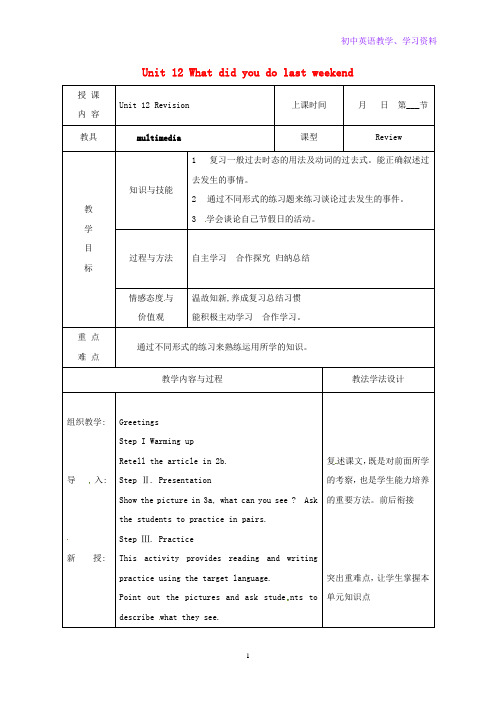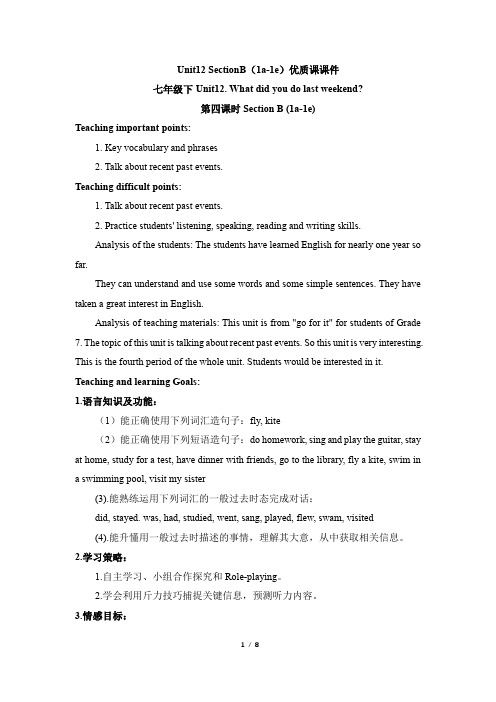人教版英语七年级下册 unit12 第6课时 教案
人教版七年级英语下册Unit 12公开课课件

Saturday afternoon?
A: What did you do on
Saturday evening?
B: I ……
Sunday morning?
Sunday afternoon?
Sunday evening?
While writing
While writing, please pay attention to :
1.The tense (the past tense of the verbs)
2.Try to use some words such as and, then, because, but, although, however, etc.
While writing
Write about your last weekend.
Guess!
Question 5 : Why do I do these?
A. B you
ehnajvoeythoedlpoTintahgsesykeo. u2r :students
improvPinug tthetihr Eengslieshn. tences in order.
10、阅读一切好书如同和过去最杰出的人谈话。2021/7/202021/7/202021/7/207/20/2021 6:54:56 PM
11、一个好的教师,是一个懂得心理学和教育学的人。2021/7/202021/7/202021/7/20Jul-2120-Jul-21
12、要记住,你不仅是教课的教师,也是学生的教育者,生活的导师和道德的引路人。2021/7/202021/7/202021/7/20Tuesday, July 20, 2021
Topic
人教版英语七年级下册教案:Unit12 What did you do last weekend ? Section B(2a-2c)

Unit 12 Section B(2a-2c)教案【教学目标】1. 学生根据图片和文章标题等||,预测新课内容||。
2. 学生能通过不同的阅读策略||,整体感知文章结构(总分)、搜寻主题句、关键词捕捉文章信息||。
3. 通过完成一系列问题掌握文章的写作手法、写作顺序、写作结构||,熟练掌握目标语言结构:Last weekend was...but...; so...that…; see...doing...; feel...doing...和大量的动词短语||。
4. 通过了解蛇和印度文化||,拓宽视野||。
【教学重难点】●重点:熟练掌握文章中出现的所有动词短语||,熟练掌握动词过去式的写法||。
能借助不同的方式复述故事||。
●难点:通过读故事提炼出文章的结构(总分)、顺序(时间顺序)、内容(六要素:how||,what||,who||,when||,where||,why||。
【课前准备】课本、多媒体课件、学案||。
【教学方法】头脑风暴、情景交际法、predicting||,skimming||,scanning||,careful reading||,detailed understanding||,catching and filling in the key words||,putting in the right order||,retelling等阅读策略、观察与思考、构建图式、文化渗透等||。
【新课导入】Step l: Lead-inBrainstorming: Can you list as many adjectives of describing animals as possible||,【新知呈现】Step 2: Presentation (2a)1. Brainstorming: Can you list animals we have learned? What kinds of animals are you sometimes afraid of? (Put a for being afraid of) Why?Animals Be afraid of Why2. Work in groups. Exchange your ideas with your group members.3. Ask several students to share their ideas in front of whole class.(设计意图:通过brainstorming复习动物词汇||,通过询问学生What kinds of animals are you sometimes afraid of? Why? 引出交际的内容||,激活与文章有关的背景知识||,鼓励学生发表个人看法||,在最短的时间里融入英语课堂||。
人教版七年级下册英语Unit 1-Unit 12教学设计

人教版七年级下册英语Unit 1-Unit 12教学设计一. 教材分析人教版七年级下册英语教材共包括12个单元,每个单元都围绕一个特定的主题展开。
教材内容丰富,涉及到日常生活中的各种场景,如学校生活、家庭成员、食物、运动等。
每个单元由几个板块组成,包括对话、阅读、听力、写作和语法等。
通过对这些板块的学习,学生可以提高自己的英语听、说、读、写和语法运用能力。
二. 学情分析学生在七年级下学期已经掌握了部分基本的英语词汇和语法知识,具备一定的英语听说读写能力。
但部分学生对英语的学习兴趣不高,学习积极性有待提高。
此外,学生的英语水平参差不齐,有的学生基础较好,有的学生基础较弱。
因此,在教学过程中,需要关注学生的个体差异,调动学生的学习兴趣,促使他们积极参与到课堂活动中。
三. 教学目标1.知识目标:学生能够掌握本单元的词汇、语法和功能句型,了解相关文化背景知识。
2.能力目标:学生能够在实际情境中运用所学知识进行交流,提高听、说、读、写和语法运用能力。
3.情感目标:激发学生学习英语的兴趣,培养积极的学习态度,提高合作意识和跨文化交际意识。
四. 教学重难点1.重点:本单元的词汇、语法和功能句型。
2.难点:词汇的准确运用、语法结构的掌握以及实际场景中的交际运用。
五. 教学方法1.任务型教学法:通过完成各种任务,激发学生的学习兴趣,培养学生的实践能力。
2.情境教学法:创设真实情境,让学生在实际语境中学习英语,提高交际能力。
3.差异教学法:关注学生的个体差异,调整教学策略,满足不同学生的学习需求。
4.合作学习法:鼓励学生分组合作,培养团队精神,提高沟通能力。
六. 教学准备1.教材、课件和教学资源:准备相关教学材料,包括教材、课件、图片、视频等。
2.教学设备:电脑、投影仪、音响等设备。
3.学习用品:笔记本、笔等。
七. 教学过程1.导入(5分钟)利用图片、视频或歌曲等引导学生进入学习情境,激发学生的学习兴趣。
例如,本单元主题是关于食物,可以展示各种美食图片,引导学生谈论他们喜欢的食物。
七年级英语下册Unit12WhatdidyoudolastRevision教案人教

Unit 12 What did you do last weekend授课内容Unit 12 Revision 上课时间月日第___节教具multimedia课型Review教学目标知识与技能1复习一般过去时态的用法及动词的过去式。
能正确叙述过去发生的事情。
2通过不同形式的练习题来练习谈论过去发生的事件。
3学会谈论自己节假日的活动。
过程与方法自主学习合作探究归纳总结情感态度与价值观温故知新,养成复习总结习惯能积极主动学习合作学习。
重点难点通过不同形式的练习来熟练运用所学的知识。
教学内容与过程教法学法设计组织教学: 导入: 新授: GreetingsStep I Warming upRetell the article in 2b.Step Ⅱ. PresentationShow the picture in 3a, what can you see ? Askthe students to practice in pairs.Step Ⅲ. PracticeThis activity provides reading and writingpractice using the target language.Point out the pictures and ask stude nts todescribe what they see.复述课文,既是对前面所学的考察,也是学生能力培养的重要方法。
前后衔接突出重难点,让学生掌握本单元知识点Ⅳ. Self Check11. Review the phrases in this unit, complete thephrases in self check 1.Ask students do the知识点梳理exercise by themselves, then check the answer.StepⅤ. Self Check 2This activity provides reading and writingpractice using the target language.1. Make the students complete the conversation.Mov e around the room monitoring p rogress andgiving language support as need ed.Summarize the important pointsNow write a travel dia ry .Imagine you are anAmerican student on vacation in Beijing.go out with friends fly a kitego for a walk milk a cowpick apples camp near the laketake photos study for a test。
2019-2020学年人教版英语七年级下册Unit12SectionA(1a~2d)教案

4.学习能力:通过小组合作、讨论等方式,培养学生自主学习、合作探究的能力,提高学习效率。
三、教学难点与重点
1.教学重点
-词汇:本节课的核心词汇包括post office, police station, bank, hotel, restaurant等地点名词,以及down, left, right等方向词。教师需重点讲解和让学生熟练掌握这些词汇,以便在实际场景中运用。
-句型:How do I get to...?和Go down... Turn left...等问路和指路句型是本节课的重点,教师应引导学生通过听力、阅读和口语练习,熟练运用这些句型。
-一般现在时态:通过短文阅读,复习一般现在时态的用法,强调动词第三人称单数形式的正确使用。
2.教学难点
-方向词的运用:学生在描述路线时,容易混淆方向词,如left和right,教师应通过图示、手势等直观教学方法,帮助学生理解并正确使用方向词。
其次,我发现部分学生在方向词的运用上还存在一定的困难。在接下来的教学中,我需要更加关注这一点,通过丰富多样的教学活动,如手势、图示等,帮助学生更好地理解和记忆方向词。
此外,小组讨论环节让我看到了学生们的合作精神和思考能力。他们在讨论中相互启发、共同解决问题,这对于培养他们的团队协作能力具有重要意义。然而,我也注意到部分学生在讨论中过于依赖同伴,独立思考能力有待提高。在未来的教学中,我将注重引导学生独立思考,提高他们的自主学习能力。
2.实验操作:为了加深理解,我们将进行一个简单的角色扮演活动。学生模拟问路和指路的场景,实际运用所学知识。
3.成果展示:每个小组将向全班展示他们的讨论成果和角色扮演的结果。
七年级英语人教版下册Unit12_SectionB(1a-1e)优质课教案(辽宁省)

Unit12 SectionB(1a-1e)优质课课件七年级下Unit12. What did you do last weekend?第四课时Section B (1a-1e)Teaching important points:1. Key vocabulary and phrases2. Talk about recent past events.Teaching difficult points:1. Talk about recent past events.2. Practice students' listening, speaking, reading and writing skills.Analysis of the students: The students have learned English for nearly one year so far.They can understand and use some words and some simple sentences. They have taken a great interest in English.Analysis of teaching materials: This unit is from "go for it" for students of Grade 7. The topic of this unit is talking about recent past events. So this unit is very interesting. This is the fourth period of the whole unit. Students would be interested in it. Teaching and learning Goals:1.语言知识及功能:(1)能正确使用下列词汇造句子:fly, kite(2)能正确使用下列短语造句子:do homework, sing and play the guitar, stay at home, study for a test, have dinner with friends, go to the library, fly a kite, swim ina swimming pool, visit my sister(3).能熟练运用下列词汇的一般过去时态完成对话:did, stayed. was, had, studied, went, sang, played, flew, swam, visited(4).能升懂用一般过去时描述的事情,理解其大意,从中获取相关信息。
人教版英语七年级下册Unit12WhatdidyoudolastweekendⅡ课时教学设计
1.教师结合图片和实例,向学生讲解一般过去时态的用法,强调动词过去式的变化规则。
2.引导学生关注一般过去时态的句子结构,如:主语+动词过去式+其他。
3.教师通过板书、PPT等形式,呈现本课时的重点词汇和句型,让学生跟读、模仿,并注意纠正发音。
4.通过师生互动、生生互动,让学生在实际语境中练习一般过去时态,提高口语表达能力。
2.采用任务型教学法,培养学生合作意识:设计小组活动,让学生相互询问和分享彼此的周末活动,提高学生的口语表达能力,同时培养合作意识。
3.注重分层教学,关注个体差异:针对不同水平的学生,设计不同难度的练习和任务,使每个学生都能在课堂上得到锻炼和提升。
4.利用多媒体资源,提高教学效果:运用图片、视频等教学资源,生动形象地展示一般过去时态的用法,帮助学生更好地理解和记忆。
二、学情分析
针对人教版英语七年级下册Unit 12 "What did you do last weekend?"第二课时,我们对学生的学情进行分析。七年级学生经过前一阶段的学习,已经具备了一定的英语基础,对一般现在时态和一般过去时态有了初步的认识。在此基础上,学生对本课时的一般过去时态描述过去活动的内容更容易接受和掌握。此外,学生对日常生活的词汇和句型有一定了解,但口语表达和听力理解能力仍有待提高。
四、教学内容与过程
(一)导入新课
1.教师通过展示一组关于周末活动的图片,如:go shopping, visit grandparents, do homework等,引导学生回顾上一课时所学内容。
2.邀请学生用一般过去时态分享自己的周末经历,激发学生学习兴趣,为新课的学习做好铺垫。
3.引导学生观察图片中的活动,发现并用一般过去时态描述图片中的动作,为新课的语法点做预热。
人教版七年级英语下Unit 12 Don′t eat in class教学设计示范教案the 1st period)
Unit 12 Don’t eat in class.教学设计Unit 12 Don’t eat in class.Ⅰ.Analysis of the Teaching Material1.Status and FunctionIn this unit students learn to talk about school and family rules.Such a topic is so familiar to students that they must be active in all the activities in class.It is helpful to raise learning interest and useful to improve students’ listening,speaking,reading and writing skills.(1)The first period introduces some negative imperatives first.Then students are provided with much listening and oral practice using the target language “What are the rules?We can’t arrive late for class.”(2)In the second period students do much listening and oral practice using the words “can”and “can’t”.After this class,students know more about what they can or can’t do at school.(3)The third period provides students with much oral practice using the phrase “have to”.And the game in the last part is useful to raise learning interest.It is useful to improve students’spoken English.(4)In the fourth period students learn to talk about what they have to do or don’t have to do at home.(5)In the fifth period students learn to write a letter to talk about their family rules.And they also learn to talk about some common signs.All the activities are designed to improve students’reading and writing skills.(6)The self check in the last period is designed to give students more reinforced practice,especially writing practice.In this way,students better understand how to apply what they have learned in their daily life.2.Teaching Aims and Demands(1)Knowledge ObjectsIn this unit students learn to talk about rules.Make students learn and grasp imperatives and the usage of the words “can”and “have to”.(2)Ability ObjectsTrain students’ listening,speaking,reading and writing skills.Train students’ integrating skills.(3)Moral ObjectAs students,we must obey school rules.3.Teaching Key PointsLearn the key vocabulary and the target language.Learn the imperatives and the words “can”and “have to”.4.Teaching DifficultiesTrain students’ listening,speaking,reading and writing skills.Learn to write a letter.5.Studying WaysTeach students how to talk about rules in daily life.Ⅱ.Teaching Guidancenguage FunctionTalk about rules.2.Target LanguagesDon’t eat in class!Can we wear hats?No,we can’t.We don’t have to wear a school uniform.3.StructuresImperatives.Can for permission.Modal have to.4.Key Vocabularyin class, classroom, hallway, gym, arrive,hate,go out, practice, inside, outside, uniform, sports shoes,fight,can,can’t,have to5.Learning StrategiesScanning.Deducing.Ⅲ.A Diagram for Topic Wordsc a n't,c a nc l a s s r o o m,h a l l w a y s, u n i f o r m,s n e a k e r s, f i g h th a v e t oa r r i v e,i n s i d e,g o o u t, o u t s i d e,p r a c t i c e,l a t eR u l e sⅣ.A Diagram for Topic Thinking and Task-based ActivitiesⅤ.Teaching TimeSix periods.The First Period Ⅰ.Teaching Aims and Demands1.Knowledge ObjectsKey Vocabularyin class,rule,hallway,classroom,Ms,fightSchool RulesDon’t arrive late for class.Don’t run in the hallways.Don’t eat in the classrooms.Don’t listen to music in the classrooms.Don’t fight.Target LanguagesWhat are the rules?Well,we can ’t arrive late for class.2.Ability ObjectTrain students ’ listening and speaking skills.3.Moral ObjectAs students,we must obey school rules.Ⅱ.Teaching Key PointsThe school rules and the target language.Ⅲ.Teaching DifficultiesLearn to talk about the school rules.Train students ’ listening and speaking skills.Ⅳ.Teaching MethodsScene teaching methods.Listening and oral practicing methods.Ⅴ.Teaching AidsPictures.A projector.A tape recorder.Ⅵ.Teaching ProceduresStep Ⅰ RevisionReview some key words and language points learned in Unit 11 briefly.Step Ⅱ 1a Show the following pictures on the screen by a projector. 1 2 34 5学校走廊Point to the pictures one by one and teach students to say,Don ’t arrive late for class.Don ’t run in the hallways.Don ’t eat in the classrooms.Don ’t listen to music in the classrooms.Don ’t fight.Write the rules on the blackboard.Read and have students repeat several times.Students open their books.Point out the list of school rules.Invite a different student to read each rule to the class.Call students ’ attention to the picture.Say,Each of these students is breaking one of these rules.Write the number of the rule each student is breaking in the box next to him or her.Point out the sample answer.Students do the activity individually.Check the answers.Answers1.boy looking at his watch2.boy running in the hallway3.girl eating an apple4.boy with headphones5.boys sitting at desks,fighting(This activity introduces the key vocabulary.)Step Ⅲ1bAsk students to read the five rules in activity 1a once more.Point to the three names.Say,You are to listen to a conversation.Three students are breaking the rules.Listen and write the number of the rules next to the name of the student who is breaking the rules.Play the recording for the first time.Students only listen.Play the recording again.This time students listen and fill in the number of the rule after each name.Correct the answers.AnswersPeter:2 Nicki:3 Joseph:4TapescriptMs Clark:Hey,Peter.You know the rules.Don’t run in the hallways.Peter:Sorry,Ms Clark.Mr Smith:Nicki,don’t eat in class.Nicki:Oh,sorry,Mr Smith.Mr Smith:Hey,Joseph.Don’t listen to music in class,Joseph!Boy 1:He can’t hear you,Mr Smith.(This activity provides listening practice using the target language.)Step Ⅳ1cInvite a pair of students to read the sample conversation to the class.Write it on the blackboard.Put students into pairs.Say,Student A is an exchange student.He or she doesn’t know the rules in the school.Student B tells him or her about the rules in 1a.Get students to work in pairs.As they are working,move around the room offering help as needed.Get some pairs of students to present their conversation to the class.(This activity provides oral practice using the target language.)Step ⅤSummaryIn this class we’ve mainly learned to talk about school rules.As students,we must obey school rules.Step ⅥHomeworkWrite down the rules in activity 1a without looking at books.。
人教版七年级英语下册Unit 12 《What did you do last weekend》PPT课件
2a Listen and underline the words you hear.
1. __B__ I visited my (aunt/grandma). 2. ____ I did my (homework/sports). 3. ____ I studied for the (English/math) test. 4. ____ I went to a (farm/beach). 5. ____ I fed some (sheep/cows).
英语中house既可表示房子,也可表示 家,与所处的语境密切相关。 例如:a big house 表示“一座大房子”。 I hope you all can come to my house
this Sunday for coffee. 我希望这个礼拜天你们全都能够来我家 喝咖啡。
3.…, but I'm kind of tired now. 但现在我有点累。 tired 作形容词,意思是疲倦的;疲 劳的;累的;厌烦的。
butterfly house with over 200 kinds of butterflies! I told the visitors about them and their living habits. Did you have a good weekend? Paul: Yeah, it was good, but I’m kind of tired now. I stayed up late to watch the soccer game.
No, they didn't.They camped.
Did they go to the farm yesterday? No, they went to the lake.
- 1、下载文档前请自行甄别文档内容的完整性,平台不提供额外的编辑、内容补充、找答案等附加服务。
- 2、"仅部分预览"的文档,不可在线预览部分如存在完整性等问题,可反馈申请退款(可完整预览的文档不适用该条件!)。
- 3、如文档侵犯您的权益,请联系客服反馈,我们会尽快为您处理(人工客服工作时间:9:00-18:30)。
Unit 12 Life is full of the unexpected. Section B 3a—Self check 一、【教材分析】
教 学 目 标
知识 目标
1. 复习并掌握下列单词和短语: backpack, oversleep, give … a lift, miss, unexpected, block, worker, stare, disbelief, above, burn, alive, airport, till, west, cream, workday, pie, show up, bean, market, fool, costume, embarrassed, costume party, announce, spaghetti, hoax, sell out, discovery, lady, cancel, officer, believable, disappear, embarrassing 2. 能熟练掌握运用过去完成时的句式: (1)By the time I got up, my brother had already gotten in the shower. (2)But before I got to the bus stop, the bus had already left. (3)Well, at least by the time you got to school, you were only five minutes late for class. (4)Before I could join the others outside to see what was going on, the first plane had already hit my office building. (5)But by the time I got to the airport, my plane to New Zealand had already taken off. 能力 目标 能够根据所学知识进行写作,提高写作能力。
情感 目标 注意人们所持文化认同感和对玩笑容忍度的差异, 愚弄他人时应持审慎及得当的态度。
教学重点 掌握并熟练运用本单元的词汇、常用表达及句型。 教学难点 能够在写作中熟练运用一般过去时和过去完成时这两种时态。 教学方法 自主探究教学法;任务型教学法;写作策略 二、【教学流程】 环节 师生活动
I. 复习 热身 1. Daily report 本课时复习本单元的话题,训练学生的听力。 Find two students to give a report. Talk about the unexpected in their daily life. 2. Talk show (Speaking) 小组合作学习,复习本单元的重点词汇及句型,教师对学生展示的情况进行适当的指导和补充。 When I got to school, I realized that I had left my backpack at home. By the time I got back to school, the bell had rung. Before I got to the bus stop, the bus had already left. Talk about the unexpected in their daily life. A: What happened to you on…? B: Well, a friend invited me to a costume party… II. 基础回顾 1. Words and expressions 1). Have a dictation Students write down some words and expressions. Then check each other. Give students several minutes to review them. 2). 用括号内单词的适当形式填空。 (1). The little girl gets ______ (dress) herself every day. (2). None of my friends showed up at 10, so I realized it was a trick and felt really________(embarrass). conversations with friends. (3). We can trust what he said. He is a______ (believe) person. (4). His parents are both _________ (office) in the army in Beijing. (5). It will not be _________(expect) if Tom comes late again, because he is always like this. (6). Tamara stared at him in______(belief), shaking her head. (7). He was trapped in a _______(burn) house. (8).People _______(live )should try their best to live better. (9).What do you do on April ________ (fool) Day? (10). Tom got __________(marry) to Mary 5 years ago. Answers: Self check 1: ➢ Let some students read the words in the box. Make sure all the students know the meanings of the words . ➢ Let students read the sentences in Self Check 1. Then students try to fill in the blanks with the correct form of the words in the box. ➢ Let some students read their answers. Check the answers with the students . 2. Grammar 1). Talk about Past Perfect Tense. (Grammar focus) When I got to school, I realized that I had left my backpack at home. By the time I got back to school, the bell had rung. Before I got to the bus stop, the bus had already left. 2). Finish the exercises 3). Self check 2: ➢ Tell students that they have to fill in the blanks with past perfect tense . More than one answer may be possible. ➢ Students think and try to complete the sentences by themselves. ➢ Let some students read their answers to the class. ➢ Share their answers together. 3.Listening practice Listen and fill in the chart 4. Reading Finish the reading practice . 5. Group work Activity 3a Can you remember a lucky or an unlucky day? What happened? Make some notes about what you remember.
III. 点击中考 1. 单项选择。 1).We ____ four thousand new words by the end of last year. A. learned B. had learned C. have learned D. will learn 2). He told us that he ____ the letters already. A. will post B. have posted C. was posting D. had posted 3). Lily is outgoing. She likes ______ others. A. play jokes on B. playing jokes on C. to play jokes with D. playing jokes with 4— Jim, you look sleepy. What's wrong ? — I _______ to write a report last night. A. looked up B. ended up C. stayed up D. took up 5). On New Year everyone _____ and goes out to visit friends and relatives. A. gets dressed B. puts up C. hurries up D. looks up IV. 语言运用 1. Reading practice 2. Writing Activity 3b Write a story about your lucky or unlucky day and tell your story to a partner or the class. 1) 写作指导 本篇作文主要是写关于意外发生的事件的,首先,交代when然后what,why。作文主题部分要写事情发展经过,即what happened next。运用过渡词进行上下衔接。如:later that day, then,finally。最后交代结局时什么。别忘了写上自己的感受。I think…what a lucky/an unlucky day! 2)Useful expressions I will always remember the date… This was the luckiest day of my life… Later that day … I couldn’t believe… After that… Finally…
